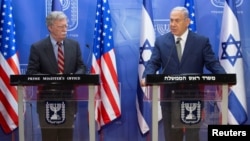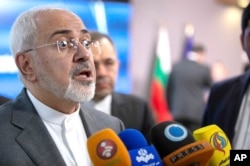U.S. President Donald Trump's national security adviser on Monday called the international nuclear agreement with Iran a "wretched deal" and said the United States is working to persuade European allies to apply more pressure on Iran.
John Bolton spoke in Jerusalem where he met for a second consecutive day with Israeli Prime Minister Benjamin Netanyahu.
Bolton said preventing Iran from acquiring a nuclear weapon is an issue of "the highest priority" and the reason Trump decided to withdraw from the 2015 nuclear deal and reapply a set of economic sanctions.
The United States partnered with Britain, China, France, Russia and Germany to make that agreement with Iran, which pledged to limit its nuclear program in exchange for sanctions relief.
The group of world powers acted in response to the belief Iran was working on a nuclear weapons program, which the Iranian government denied.
Like Trump, Netanyahu was also a fierce critic of the agreement, saying it gave Iran too much in exchange for too little. He said Monday that all countries that believe in peace and security should follow the United States and increase pressure on Iran.
Before leaving for Israel, Bolton told ABC News that the U.S., Israel and Russia share the same objective — getting Iranian forces, militias and their surrogates out of Syria and Iraq. He also said Iran must end its support for Lebanese-backed Hezbollah.
Bolton will also visit Ukraine this week and meet with Russian officials in Geneva in a follow-up to Trump's talks in Helsinki with Russian President Vladimir Putin.
After the U.S. withdrawal from the nuclear deal, the other signatories pledged to keep the agreement in place.
Iranian Foreign Minister Mohammad Javad Zarif told CNN on Sunday that he believes the deal can be kept alive with the other parties.
He also criticized the U.S. approach, saying the government has an "addiction to sanctions" and that such measures do not achieve the desired political outcomes the United States seeks.
The International Atomic Energy Agency, which is monitoring the implementation of the deal, has said in 11 consecutive reports that Iran is in compliance and that the agreement has allowed for greater verification of Iran's nuclear activities.






